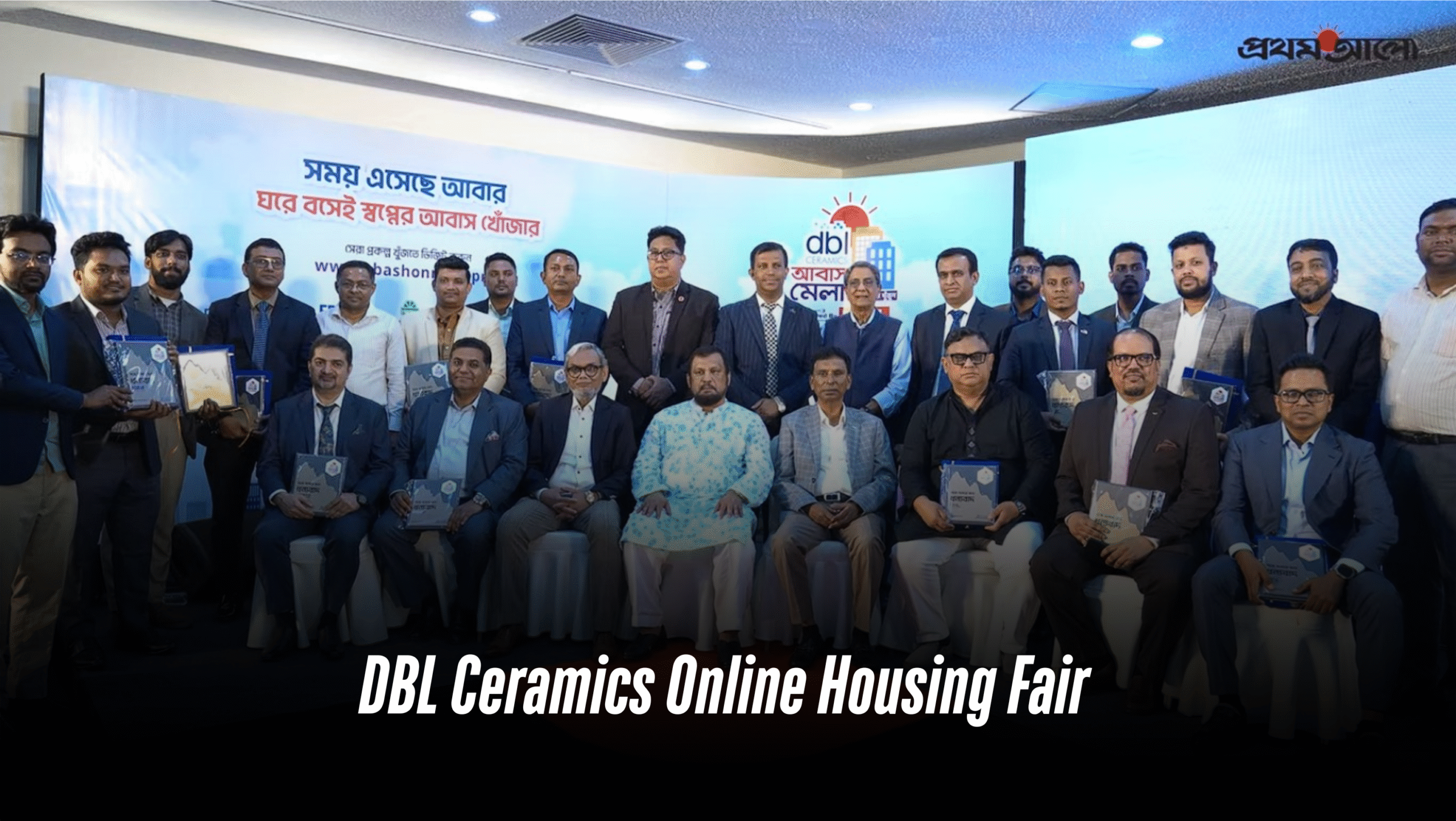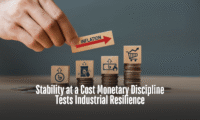
At big housing expos, the noise is usually deafening — developers pitching, buyers bargaining, stalls glittering with scale models of shiny towers.
This year, the spectacle has gone quiet. The DBL Ceramics Online Housing Fair, hosted by Prothom Alo Digital, opened on August 25 with only a small ceremony at Hotel Sonargaon, while most of the action unfolds on computer screens and phones.

Over the next ten days, until September 3, prospective buyers can browse more than 256 projects from 38 housing companies on abashonmela.pro.
The listings include 283,000 kathas of land, 5,230 flats, and 412,000 square feet of commercial space — all available to explore without leaving home. The fair’s slogan captures the idea simply: “The Opportunity Has Come Again. Find Your Dream Home from Home.”
A Digital Market for a Stubborn Dream
Bangladesh’s appetite for land and housing has never been small. In a country where urbanization runs ahead of infrastructure, the dream of owning a flat in Dhaka remains one of the most powerful middle-class aspirations.
Families save for years, often with support from relatives abroad, only to find that prices have risen faster than their savings. With national elections due in February, many are waiting for signs of stability before taking the plunge.
Against this backdrop, the launch of an online housing fair offers more than just marketing. It is, for many, a way to keep the dream alive.

“Organising an online housing fair was a new idea in Bangladesh,” said Matiur Rahman, Editor and Publisher of Prothom Alo, at the inauguration ceremony in Dhaka. “Through it, we even gained
international recognition.”
He acknowledged the pressures the industry now faces. “The housing sector is going through a crisis, largely because of the political transition a year ago,” he said.
“Every political change affects business. We hope that after the coming election, a new government will create the stability we need to move forward.”

“The world is moving forward rapidly,” said MA Quader, Deputy Managing Director and Group CEO of DBL Group. “Whether in Dhaka or abroad, you can now search for flats and plots online. That opportunity is a gift.”
For many, the gift is convenience. For developers, it is survival. With traditional sales slowing, the fair offers visibility at a time when foot traffic to offices and showrooms has dwindled.
Shoppers browsing from London or Singapore can now weigh Dhaka apartments with the same ease as airline tickets. A growing diaspora, sending billions in remittances each year, is becoming a crucial customer base.
“Earlier, you had to call an uncle or cousin to check on a property,” said one Dhaka-based banker. “Now you can compare projects in minutes. That changes everything.”
“The online housing fair has brought a new wave of enthusiasm to the sector,” said Md Wahiduzzaman, President of REHAB. “Our members
are eager to take part, and interest will only grow in the future as people can now search for their preferred flats from the comfort of home.”

Cracks in the Foundations
Yet the optimism is tempered. Executives across the sector point to one persistent obstacle: the Detailed Area Plan (DAP) for Dhaka, which limits the height of new buildings across 80 percent of the city.
“Since the new DAP notification, the housing sector has been
paralysed,” the REHAB president said. “Our members face restrictions that make new projects difficult.”
A recent government meeting on potential revisions has raised hopes, but until decisions are finalised, developers remain cautious. “If the revisions are confirmed next month, businesses will be able to work
again,” he added.
The debate over DAP is not just technical. It touches on the core dilemma of Dhaka: a city bursting with people but running out of space.
Environmentalists argue that unchecked vertical growth could worsen congestion and strain utilities. Developers counter that without high- rise flexibility, affordable housing will vanish.
At the same time, bankers and financiers know the larger picture cannot be ignored. Loans are harder to secure, construction costs remain high, and global uncertainties feed into domestic anxieties. Still, the fair pushes ahead, offering a window into what is possible when policy, finance, and consumer demand align.
A Ballroom of Deals and Dreams

The launch night itself mixed hard economics with ceremony. Executives from IPDC Finance, Eastern Bank, Hatil, Angan Developments, Chhuti Resort, Haque Home and Builders, Onward Developers, and Shopnonibash Group took the stage. Their speeches circled back to the same themes: resilience, innovation, and the promise of stability.
“I am very optimistic,” said Quader of DBL Group. “After every night comes the morning and sunrise. We are waiting for that day.”
The fair’s format reflects this optimism in action. Visitors logging on to abashonmela.pro can sift through offerings ranging from compact apartments to sprawling land plots.
They can compare financing packages from Eastern Bank and IPDC Finance. They can weigh furniture solutions from Hatil or imagine a holiday escape at Sea Pearl Beach Resort, a co-partner of the fair.
It is part commerce, part imagination: the picture of a different life assembled from a grid of images and brochures. For some, that picture might mean a first family flat in Mirpur; for others, a gated community on the city’s northern edge.

A Who’s Who of Builders
The roster of participants this year reads like a directory of the sector’s leading names: Amin Mohammad Foundation, Rangs Properties, Edison Real Estate, Tropical Homes, Anwar Landmark, Asian Duplex Town, JBS
Holdings, North South Group, Credence Housing, Swapnonibash Assets, Bhaiya Group, Concord Group, Nest Developments, Doyel Development Properties, Team Developers, Eminence Technologies, Unimass Holdings, Haque Home and Builders, and Pinaki Holdings.
For them, the fair is not just a sales platform but a chance to signal staying power. In a fragile market, visibility matters, and buyers often look for reassurance as much as bargains. “We want to show that we’re still here,” said one developer privately. “That continuity matters in a volatile time.”

Between Hope and Uncertainty
The housing fair cannot, on its own, solve Bangladesh’s deeper economic uncertainties. Taxes loom large, import tariffs are under scrutiny, and the country’s dependency on a narrow export base
remains unresolved. But in a year of political waiting, the fair offers a momentary reprieve.
Executives pose for photographs, music drifts from the stage, and commemorative plaques are handed to company representatives. Buyers scroll through listings from their living rooms. For now, it is enough.
After all, in Bangladesh the dream of a home has always been larger than the barriers that stand in its way. Even in uncertain times, the aspiration endures — reshaped, redirected, but never extinguished.
Written by Nibir Aayan




